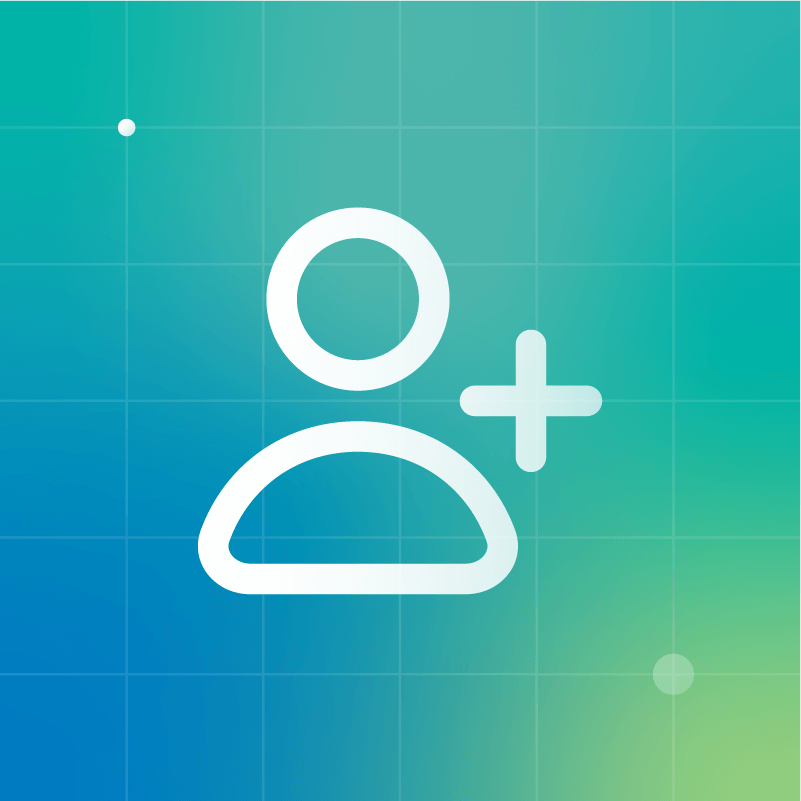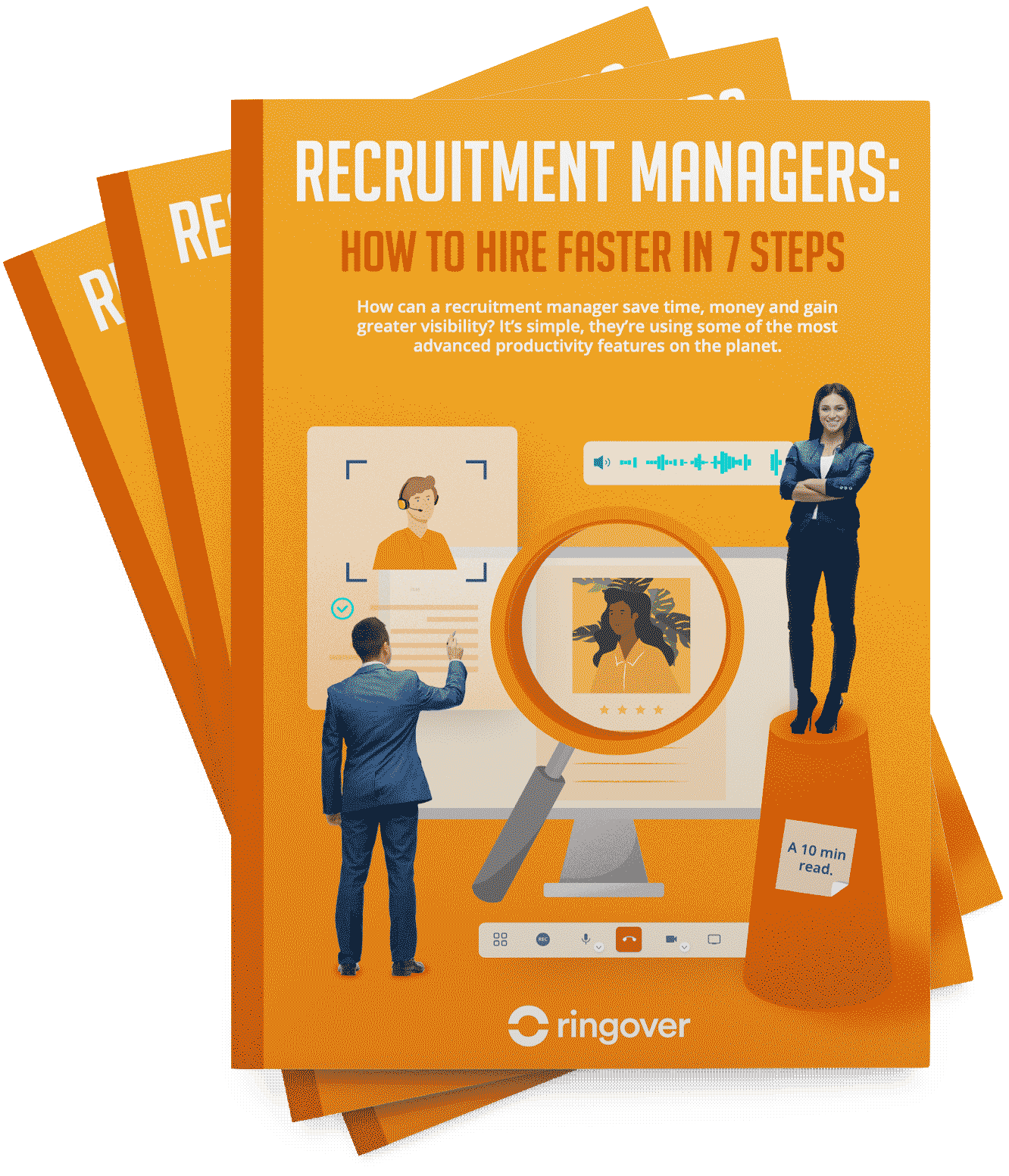Summary
For staffing agencies and firms, embracing AI has become essential to maintain a competitive edge. AI facilitates the swift identification of prime candidates, automates mundane tasks, and provides insightful, data-based analyses for pinpointing the ideal candidates for job vacancies.
This advancement is not solely about enhancing efficiency and speed; it also aims to foster a more inclusive and fair recruitment process by minimizing unconscious bias and elevating the quality of hires.
In this discussion, we delve into AI's inception within the staffing sector, review the assortment of AI tools and solutions available, and guide on selecting the appropriate AI technology. Furthermore, we'll explore AI's future impact on staffing, alongside the advantages and challenges of AI integration, offering a thorough insight into how this technology is revolutionizing the hiring process.
Origins of AI in the Staffing Industry
The arrival of AI within the staffing sector marks a relatively new yet rapidly impactful evolution. At the start of the 2000s, staffing began to embrace basic automation tools, like ATS and job boards. These initial steps signaled a technological shift, albeit not as evolved as today's AI-driven solutions. A pivotal moment was the creation of machine learning algorithms coupled with the growing access to large data sets, enabling AI to analyze and learn.
The late 2010s experienced a boom in AI adoption within staffing, fueled by breakthroughs in predictive analytics, natural language processing, and deep learning. This era introduced AI-enhanced sourcing tools, chatbots, and virtual assistants adept at scouring databases, social media, and other platforms to find and align candidates with job vacancies. These innovations started to streamline many of the manual, labor-intensive tasks of conventional recruiting, such as sorting through applications, organizing interviews, and maintaining candidate databases.
Currently, AI plays a key role in various facets of the staffing procedure, encompassing candidate sourcing, screening, predictive analytics, and talent forecasting. The technology is on a continuous path of refinement, focusing on reducing biases, improving candidate experiences, and enhancing operational efficiencies. As AI further integrates into the staffing industry, its influence is poised to expand, significantly shaping the future of recruitment and talent management.
Five AI in Staffing Software Tools
1. Empower by Ringover
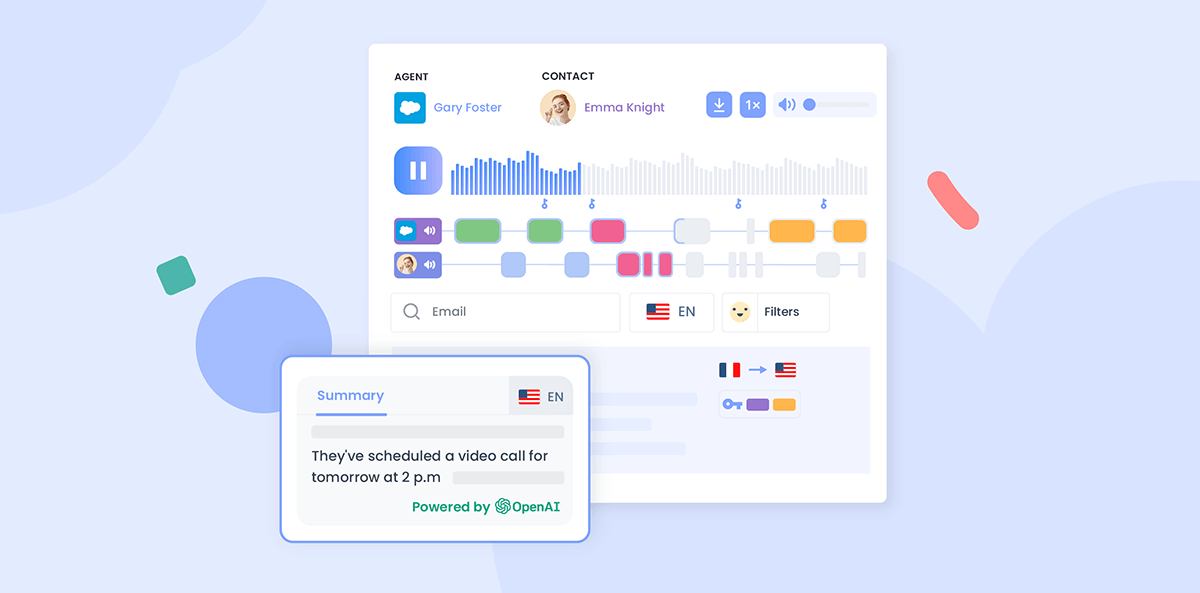
Empower by Ringover is an advanced AI-powered conversation intelligence tool designed to enhance communication workflows for businesses, including staffing firms. It integrates seamlessly with your existing staffing software and communication systems, enabling recruiters to manage client and candidate interactions more efficiently. Here are the specific benefits Empower offers to staffing firms:
Try Empower for Free!Enhanced Communication Efficiency
Empower automatically transcribes and summarizes calls, eliminating the need for manual note-taking.
It identifies next steps and follow-ups, ensuring that no client or candidate interaction is missed.
Improved Candidate and Client Experiences
By providing instant access to call insights and communication history, Empower helps recruiters respond to inquiries more effectively and deliver a personalized experience.
Sentiment analysis allows recruiters to gauge client or candidate satisfaction, helping to proactively address concerns.
Data-Driven Decisions
Empower provides in-depth analytics, such as speaking time ratios, conversation trends, and topics discussed, giving recruiters actionable feedback to refine their approach.
Insights into key metrics improve team performance and help managers identify training opportunities.
Time-Saving Automation
Automation tools streamline repetitive post-call tasks, such as logging call data or updating CRM records.
Integration with staffing software ensures that all relevant information is synced in real time, reducing administrative burdens.
Streamlined Collaboration
Centralized access to call records and summaries enhances collaboration within recruiting teams, enabling them to stay aligned on client and candidate interactions.
2. ICIMS Talent Cloud
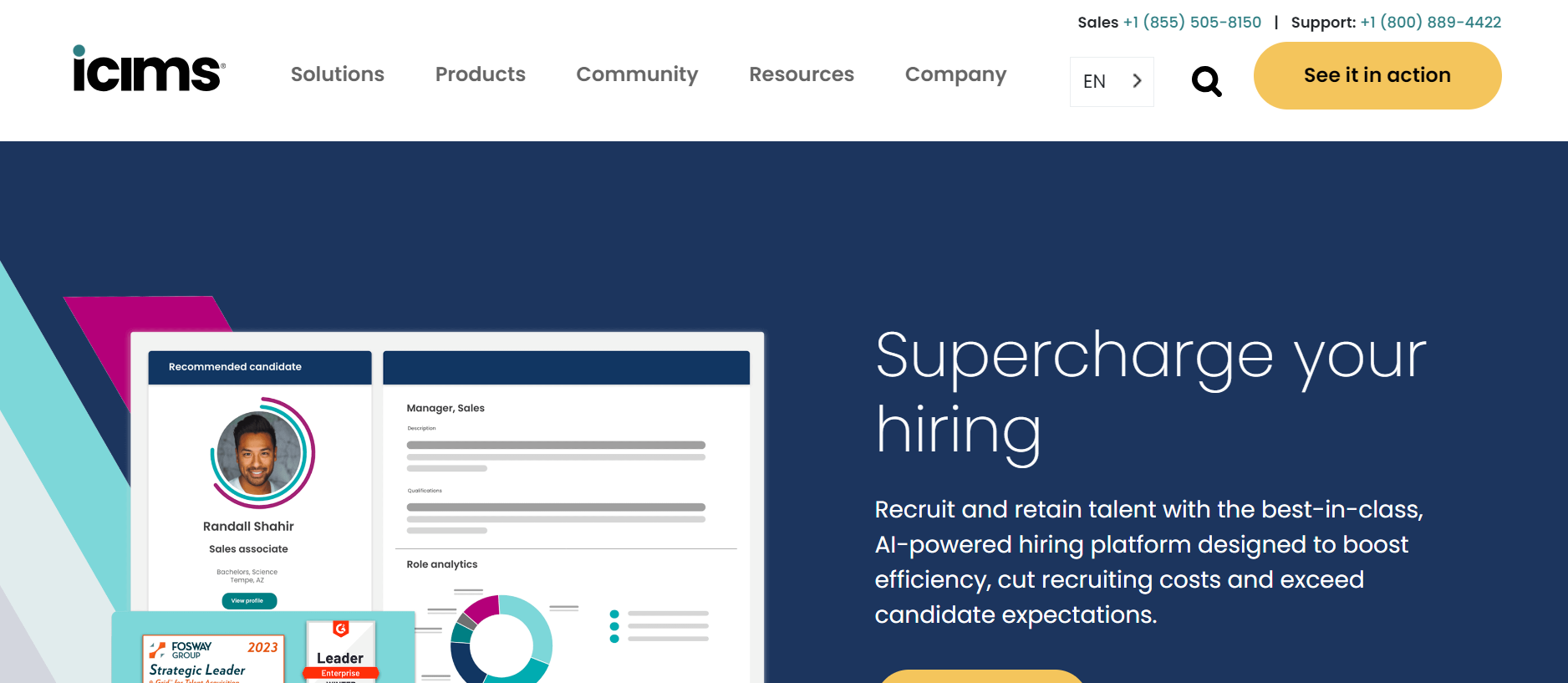
ICIMS Talent Cloud is a comprehensive recruitment platform that leverages AI to optimize various aspects of the hiring process. Its AI engine is designed to search for, match, and recommend potential job candidates. The platform includes a conversational AI bot that assists candidates with FAQs, provides access to employee-generated videos, and facilitates interview scheduling in multiple languages.
Additionally, ICIMS Talent Cloud can parse resumes, integrate with external systems like LinkedIn, and infer related skills that may not be explicitly mentioned. It also offers advanced recruiting and hiring analytics through an intuitive dashboard.
3. Skillate
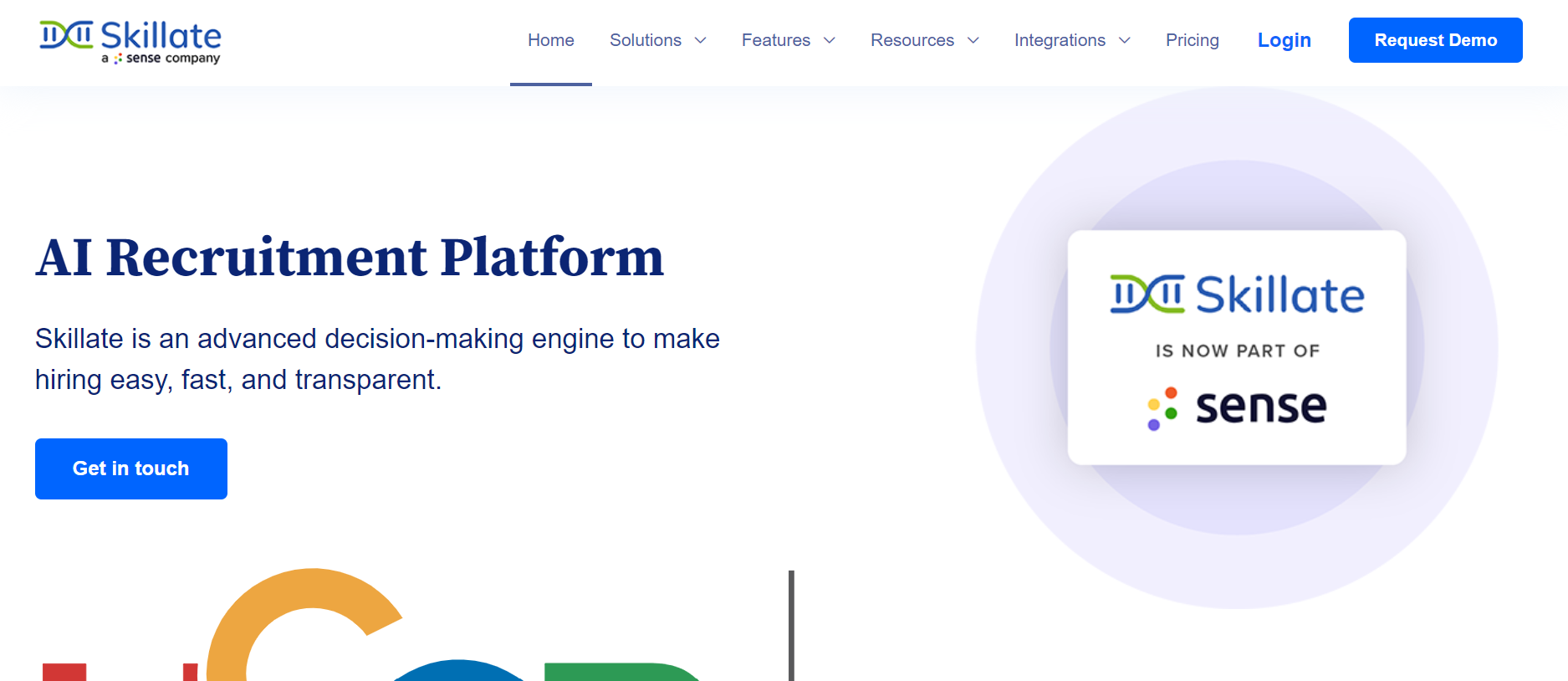
Skillate, now part of Sense, is an AI-powered recruitment platform that targets the staffing industry. It features an AI-powered matching engine, chatbot screening, resume parsing, and automatic interview scheduling. Skillate assists in writing job descriptions by suggesting better keywords and skills, and it collects resumes from various sources to rank and score them based on their fit with the job requirements.
The platform's AI algorithms have been trained on a dataset of 120 million profiles, enabling it to conduct first-round screenings and gather additional information from candidates beyond their resumes.
4. TurboHire
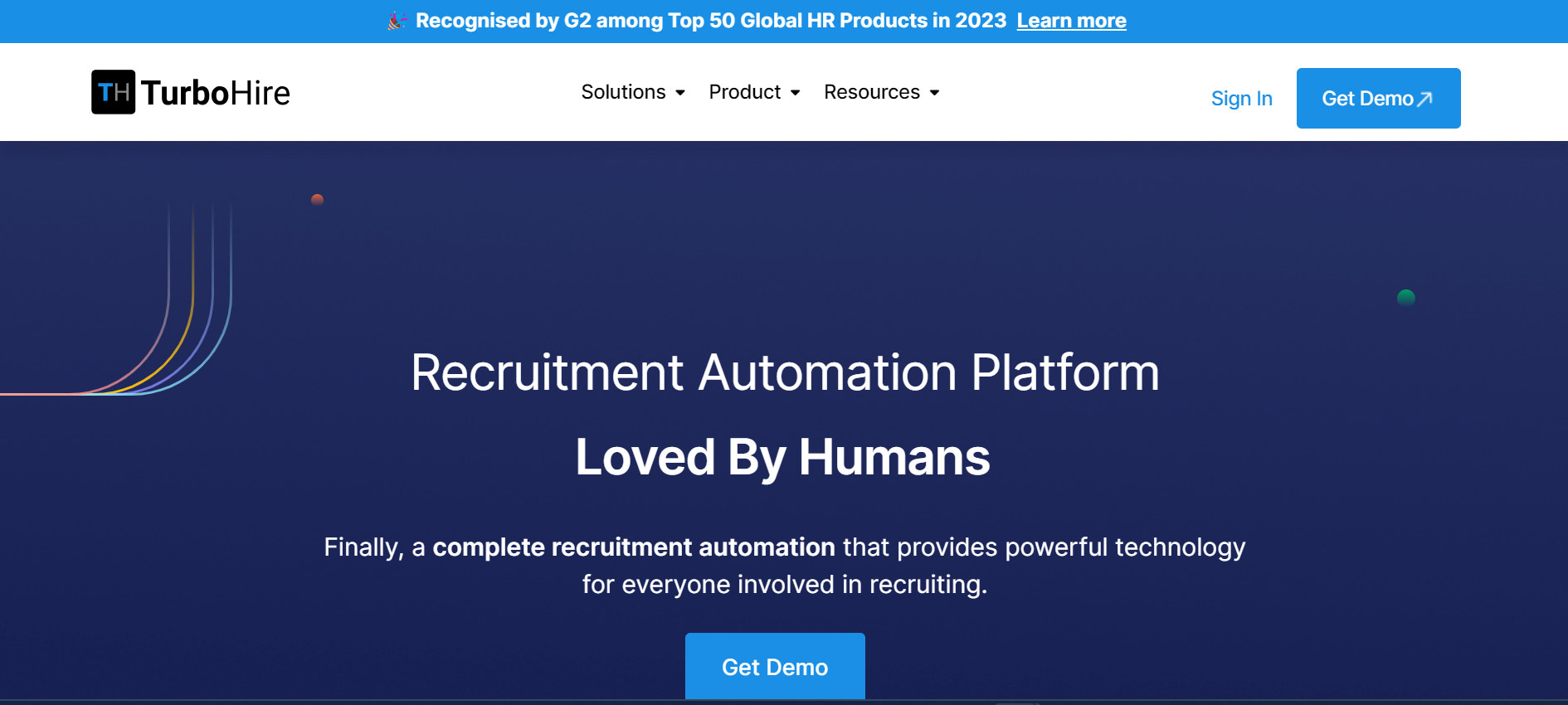
TurboHire is a recruitment automation platform that integrates AI into various recruiting tasks such as job marketing, screening, interview scheduling, feedback collection, and candidate engagement. It is particularly useful for global and high-volume hiring, offering features like bulk email campaigns and integration with WhatsApp and text messaging. TurboHire's platform includes an agency-management portal that allows partners to contribute candidates, track their status, and manage compliance.
5. Fetcher
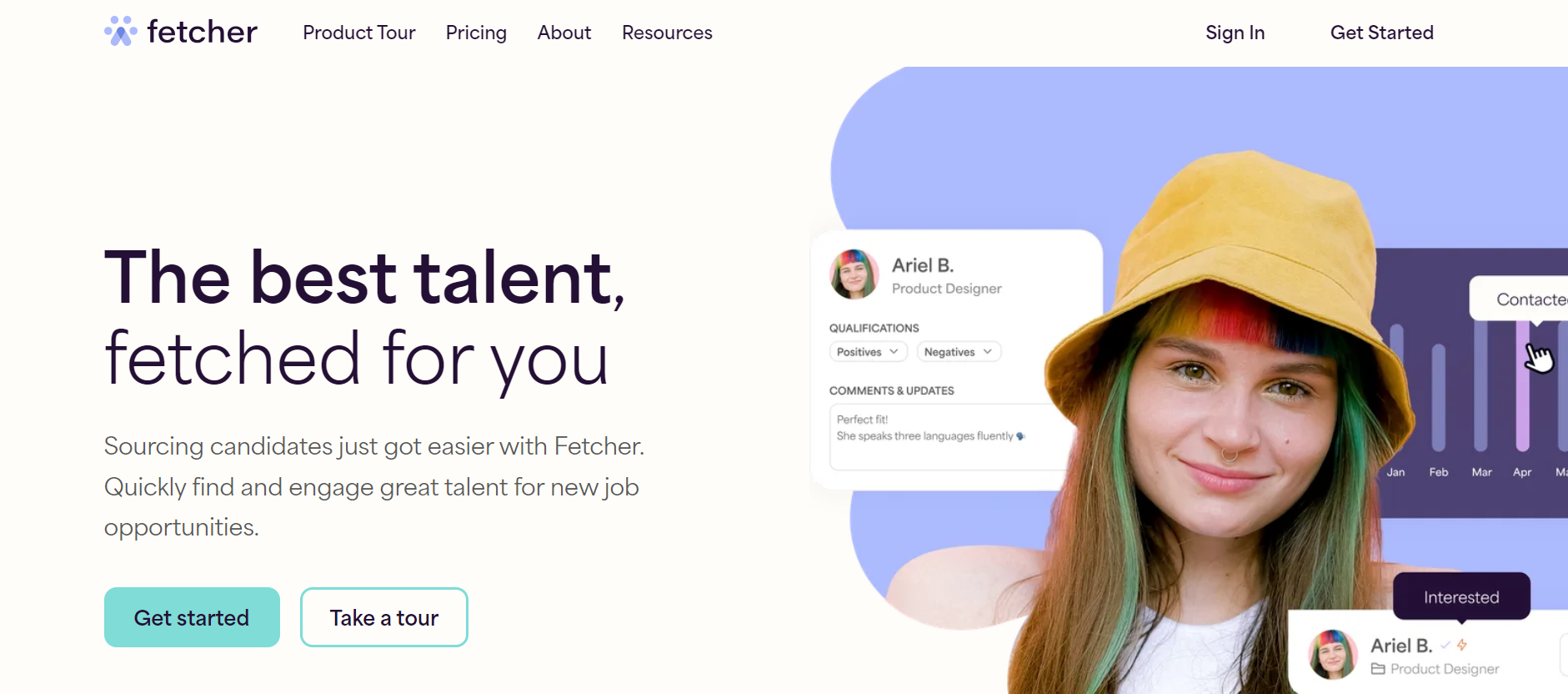
Fetcher is an AI-powered talent sourcing automation tool designed to streamline top-of-funnel hiring tasks. It identifies relevant candidates using machine learning, initiates contact via text or email, and delivers curated candidate batches.
Fetcher gathers data from various digital sources to create comprehensive profiles of potential hires, allowing employers to review them quickly. The platform also includes outreach tools such as personalized email sequences, re-messaging campaigns, and LinkedIn InMail integration.
How to Choose an AI Tool for Staffing
Selecting the right AI tool for your staffing agency is a pivotal decision that can significantly enhance your recruitment processes, efficiency, and competitive edge. To guide you in making a well-informed choice, here are several vital considerations:
Comprehensive Feature Set
It's important to opt for AI recruitment software that boasts a comprehensive suite of features, merging all essential tools into a single platform. This suite should encompass candidate management, a CRM for building talent pipelines, tools for posting jobs across multiple channels, interview scheduling functionalities, and collaborative tools for the hiring team to exchange feedback and make decisions. The platform should offer a transparent view of the entire hiring pipeline and break down complex metrics into actionable insights.
Seamless Integrations
Choose AI recruitment software that integrates effortlessly with your existing HR technology stack. Aim for platforms that provide pre-built connections with widely-used tools like Microsoft Outlook, Workday, or Slack. Seamless integration reduces the risk of human errors from manual data entry and ensures that all systems are automatically kept up to date. This not only saves time but also boosts the efficiency of your hiring process.
Robust Data Management
Data security and compliance are paramount when handling sensitive candidate information. Ensure that the AI recruitment software adheres to regulations such as GDPR and follows strict guidelines for secure data handling. The platform should offer centralized candidate profiles, communication logs, regular backups, and role-based access controls to uphold data integrity and security.
Candidate Experience Enhancement
The AI tool should aim to improve the candidate experience. Seek out features like automated communications, personalized email campaigns, and chatbot interactions that engage candidates throughout the hiring process. Tools that enable the creation of job descriptions, maintenance of candidate communications, and formulation of email campaigns from a centralized dashboard can greatly increase candidate satisfaction.
Bias Reduction and Objectivity
A significant advantage of using AI in staffing is its capability to minimize unconscious biases in the hiring process. Choose AI tools that can objectively analyze extensive data sets, pinpointing top candidates based on set criteria such as skills, experience, and cultural fit, thus promoting a more fair and efficient selection process.
Scalability and Customization
The AI tool should be scalable to accommodate the evolving needs of your staffing agency. It should feature customizable fields and search criteria to sort candidates based on specific job requirements. Moreover, the platform should be adaptable to the unique demands of your agency, whether you cater to sectors like hospitality, IT, or healthcare.
Performance Analysis and Feedback
Tracking and analyzing the performance of hired professionals is essential for ongoing improvement. Select an AI tool that offers performance analysis and feedback mechanisms, assisting in assessing the quality of work, retention rates, and overall fit of the candidates. This feedback can refine the application's algorithm, ensuring improved hiring results over time.
By carefully weighing these factors, you can choose an AI tool that not only optimizes your recruitment processes but also secures a competitive advantage in the staffing sector.
8 Ways AI Will Impact the Future of Staffing
1. 39% of staffing tasks are projected to be replaced by AI
Staffing is an industry rich with opportunities for automation, one of the main reasons why so many tasks can be handled by AI technology. For example, AI is well-suited to sort through hundreds or even thousands of candidate resumes. The same thing goes for low-value tasks like responding to routine questions that frequently come up for candidates–a chatbot can easily respond to that outreach. One of the other trends to take into account is that many jobs and tasks will be augmented by artificial intelligence. That means that AI will support the recruiter either by partially or fully completing work, requiring the recruiter to either finish or check the job.
2. Emphasis on skills-based hiring will only grow
Automation is only going to increase, necessarily leading to evolutions in the demands placed upon employees and candidates. One significant trend in recruiting is skills-based hiring, in which recruiters focus more on candidates having certain skills, rather than having a strong focus on education or other aspects of the person's background. This approach helps to single out the candidates who not only have required skills, but can also think critically and problem solve creatively–two tasks which are still beyond AI's capabilities.
3. Generative AI use will only grow
Generative AI has gained worldwide attention with the arrival of ChatGPT. There are many contexts in which recruiters need to produce text, such as nurturing a candidate, writing a job description, or even drafting marketing materials. Generative AI will become more and more ubiquitous as recruiters utilize the tools to create a first draft quickly, which they can then refine.
4. Bias may be reduced
Unconscious bias is a thorny and complex topic for recruiters, as it can be difficult to identify and even more difficult to eliminate. Even when AI is involved! Just take the example of Amazon, which built its own AI-powered tool to evaluate candidates. The tool was trained on previous hiring history at Amazon and eventually revealed a strong bias towards male candidates for technical positions like developers. With that being said, there is still great potential for AI tools to minimize bias if developed properly.
5. Candidate pools will finally be leveraged
Storing candidate information is all well and good–the trick is being able to search it easily and successfully. This is the type of problem AI excels at solving: sorting and analyzing large amounts of data to provide recommendations. Talent rediscovery software can automatically search your candidate pool whenever a new position opens, and give the best recommendations based on your data and information listed in publicly available sources, like LinkedIn.
6. Compliance will evolve
The abilities of AI to search and analyze data leads to a whole new set of legal considerations. For example, some recruiting agents now use AI software to examine video recording of candidate interviews. Certain tools, like Empower by Ringover, can even transcribe calls for sentiment analysis. This type of technology leads to many questions, like whether the candidate should be notified they are being recorded for analysis, or if it's permissible for the data to be stored. New laws have already taken effect regarding the use of AI in recruitment, and it's just the beginning.
7. Predictive analytics will become more useful
As companies establish a pattern of use with AI technology, the algorithms will be able to predict future staffing needs and trends. This type of information will help staffing agencies better position themselves to serve their clients, maximizing efficiency and profitability.
8. Continuous improvement thanks to data analysis
Now that recruitment agencies use business software so regularly and for so many aspects of the hiring pipeline, immense amounts of data are collected constantly. Once artificial intelligence is in use, this data can be used at scale, rather than for simple searches or record keeping. The technology will pinpoint bottlenecks, provide guidance on optimization opportunities, and generally support iteration of processes for continuous improvement.
Empower integrates with popular ATS, synchronizing key data like call transcripts and summaries with your ATS so the resources you need are at your fingertips when you’re interfacing with clients and candidates.
Benefits of AI in Staffing
Reduced Manual Labor and Increased Efficiency
AI significantly reduces the amount of manual labor required in the recruitment process. Robotic Process Automation (RPA) bots can handle tasks such as data entry, resume screening, and initial candidate communication, freeing up recruiters to focus on more strategic and high-value tasks.
Cost-Cutting and Improved Profit Margins
The use of AI in staffing can lead to substantial cost savings. By automating many of the tasks that were previously handled by human recruiters, staffing agencies can reduce the need for additional employees, resulting in increased profit margins.
Improved Candidate Matching and Quality of Hires
AI algorithms can analyze vast amounts of data to match candidates with job openings more accurately. This includes evaluating skills, experience, and cultural fit, leading to better placement outcomes and higher satisfaction rates for both employers and candidates.
Absence of Bias and Enhanced Diversity
AI helps eliminate unconscious biases in the hiring process by evaluating candidates strictly based on their qualifications, experience, and ability. This promotes diversity and inclusion in the workplace, ensuring that hiring decisions are fair and objective.
Predictive Analytics and Future Hiring Needs
AI-powered predictive analytics enable staffing agencies to forecast future hiring needs and identify trends in the job market. This allows agencies to anticipate market demands and adjust their strategies accordingly, ensuring they are always prepared for future challenges.
Enhanced Candidate Experience
AI-driven chatbots and virtual assistants provide candidates with 24/7 support and instant responses to their queries, significantly improving the overall candidate experience. This ensures that job seekers feel supported and informed throughout the recruitment process.
Personalized Job Recommendations
AI can offer personalized job recommendations to candidates based on their preferences, skills, and career goals. This not only enhances the candidate experience but also increases the likelihood of successful placements.
Streamlined Communication and Administrative Tasks
AI-powered tools streamline various administrative tasks such as interview scheduling, onboarding, and compliance management. Additionally, AI-driven chatbots handle routine inquiries from candidates and employers, providing quick and accurate responses. This ensures smooth communication and efficient process management.
Challenges of Staffing AI
Job Displacement and Workforce Impact
The fear is that most repetitive tasks, and certain roles, could become obsolete, increasing unemployment numbers. AI systems can perpetuate existing biases if the data they are trained on is biased. This raises ethical concerns, such as discrimination against certain groups of candidates. Ensuring that AI systems are trained on diverse and representative data sets is important to avoid unintended biases in candidate selection. Continuous bias audits and a balanced approach to leveraging AI's strengths while being mindful of its limitations are essential.
Privacy and Data Security Concerns
The use of AI in recruitment involves handling sensitive candidate information, which requires robust protection measures. Concerns about data privacy and security are paramount, and staffing agencies must ensure that all AI tools used comply with data protection laws and regulations. Regular audits of AI systems can help ensure the security and privacy of candidate data.
Overdependency on Technology
There is a danger of becoming overly reliant on AI, which can lead to a loss of human judgment and empathy in the recruitment process. While AI can significantly enhance operational efficiency, it should be viewed as a tool to augment human decision-making, not replace it. Maintaining a balance between automation and human interaction is vital to ensure that the recruitment process remains personalized and effective.
Regulatory Challenges
The fast-paced development of AI has led to inadequate regulation in the recruitment sector. Staffing agencies must navigate evolving regulatory requirements, including labor laws, tax policies, and data protection laws. Failure to comply with these regulations can result in hefty fines and damage to reputation, highlighting the importance of staying abreast of the latest developments in AI regulation.
Human Touch and Personalization
While AI streamlines recruitment, it is vital to maintain a human touch and personalized approach. Building relationships, understanding candidate motivations, and assessing cultural fit are aspects that still require human interaction and judgment. Ensuring that AI tools do not make the recruitment process feel impersonal is essential for maintaining trust and satisfaction among candidates and clients.
Limited Compliance and Legal Frameworks
The current lack of comprehensive rules and regulations governing the use of AI in recruitment poses a significant challenge. Staffing agencies need to be cautious and proactive in ensuring compliance, as the absence of clear guidelines can lead to uncertainty and potential legal risks. Regular updates and adherence to emerging standards will be essential as the regulatory landscape evolves.
Concluding Thoughts
In conclusion, the integration of Artificial Intelligence (AI) into the staffing industry is significantly altering the recruitment process. AI is enhancing the accuracy of candidate matching, minimizing the need for manual labor, and boosting overall efficiency. It also offers the advantages of cost reduction and the capability for personalized insights into candidates, clients, and team members. To gain this level of understanding efficiently and accurately, sign up for a free trial of Empower by Ringover!
AI in Staffing FAQ
How is AI used in the staffing industry?
The main use of AI in staffing is to automate aspects of the recruitment process. This is possible because AI technology can leverage mass amounts of data for analysis and learning. With the necessary information and computing power, AI can then perform tasks such as candidate sourcing, matching, automated job posting, optimization of job ad posting, and even engage with candidates via chatbot to respond to questions during the recruitment process.
What is the future of AI in recruitment?
Artificial intelligence has many applications when it comes to AI in recruitment. The top trends for the future include:
- Increasingly advanced chabots
- Automated onboarding
- Optimized candidate matching
- Reduced unconscious bias
- Improved employee engagement
What is an AI recruitment tool?
There are many types of AI recruitment tools, but they are mainly automated recruiting tools meant to handle repetitive or data-intensive aspects of the recruitment process. The most common uses of AI recruitment tools include:
- Candidate screening
- Candidate sourcing
- Interviewing tools
- Candidate engagement (such as chatbots)
- Onboarding
How will AI affect employees?
Many employees are concerned that the rapid deployment of AI in recruiting will lead to job loss. And they are not wrong, as positions that consist of repetitive work, especially jobs involving data collection, summary, input, and simple writing tasks are likely to be handled by AI in the near future.
However, AI is still not capable of critical thinking, problem solving, relationship building, and many other complex tasks. This type of position will likely grow in importance as AI automates menial and time-consuming tasks, leading to new opportunities.
Bibliography
- https://www2.staffingindustry.com/Editorial/Daily-News/AI-could-bring-9-increase-in-workers-on-assignment-Collaboration-in-Gig-Economy-gets-rolling-66878
- https://www.thestaffingstream.com/2023/10/30/will-ai-take-your-job-or-make-you-better-at-it-a-peek-into-the-future/
- https://www2.staffingindustry.com/Editorial/IT-Staffing-Report/May-4-2023/Generative-AI-bringing-changes-to-how-firms-hire-developers
- https://legalnodes.com/article/ai-in-hr-compliance-risks
- https://www.reuters.com/article/idUSKCN1MK0AG/

